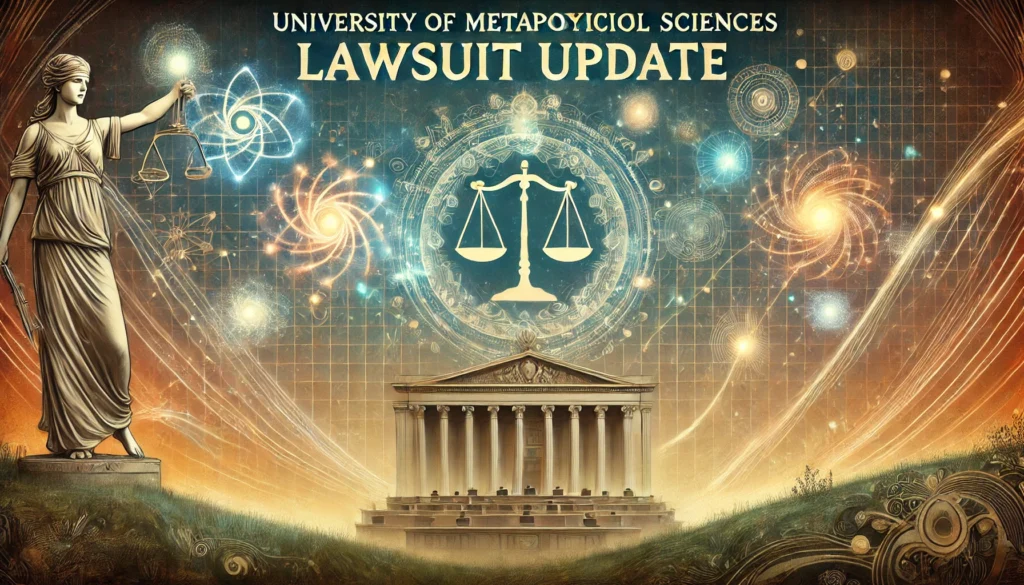Exploring the University of Metaphysical Sciences Lawsuit: Key Facts and Implications
The University of Metaphysical Sciences (UMS) has long been a recognized institution within the metaphysical and spiritual education landscape. Its mission is to provide students with a deeper understanding of metaphysics, spirituality, and holistic practices. However, recent discussions have brought attention to a legal matter involving the university, commonly referred to as the “University of Metaphysical Sciences lawsuit.” This article delves into the details of the lawsuit, its causes, and its implications for the institution and its community.
Background of the University of Metaphysical Sciences
Founded with the goal of offering accessible metaphysical education, the University of Metaphysical Sciences provides courses in spiritual development, holistic healing, and metaphysical philosophy. The institution offers online programs leading to certifications, bachelor’s, master’s, and doctoral degrees in various metaphysical fields.
Over the years, UMS has attracted a diverse student base, including individuals seeking personal growth and professionals aiming to enhance their holistic practices. The institution’s reputation has been largely positive, emphasizing its commitment to promoting spiritual awareness and practical applications of metaphysical principles.
Understanding the University of Metaphysical Sciences Lawsuit
Overview of the Legal Dispute
The “University of Metaphysical Sciences lawsuit” refers to a legal challenge involving the institution. While specific details vary depending on sources, the core issues revolve around accreditation, academic recognition, and alleged misrepresentation. Such lawsuits often arise when students or external parties question the legitimacy or claims of educational institutions operating in niche fields like metaphysics.
Primary Allegations
- Accreditation and Recognition One of the central points in the lawsuit is the issue of accreditation. Some students and critics have alleged that UMS’s degrees lack recognition by mainstream educational bodies, which could limit graduates’ opportunities in certain professional or academic pursuits.
- Marketing and Representation Claims have surfaced suggesting that the university may have overstated the career or academic advantages associated with its degrees. Plaintiffs argue that such representations might have influenced their enrollment decisions.
- Financial Transparency Another aspect of the lawsuit involves the transparency of tuition fees and refund policies. Some students have reportedly raised concerns about unclear financial terms or challenges in obtaining refunds.
The University’s Response
The University of Metaphysical Sciences has issued statements defending its practices and emphasizing its commitment to providing quality metaphysical education. UMS maintains that its programs are designed for personal enrichment and spiritual growth rather than traditional career pathways. The institution also underscores that it operates within legal frameworks for alternative education providers.
Implications of the University of Metaphysical Sciences Lawsuit
For Current and Prospective Students
The lawsuit has sparked discussions among current and prospective students about the value of metaphysical education. While some students continue to support UMS, citing the transformative impact of its programs, others are reevaluating their expectations and goals.
For the Institution
Legal challenges like the “University of Metaphysical Sciences lawsuit” can impact an institution’s reputation. UMS may need to address public perceptions and implement measures to enhance transparency and accountability. The outcome of the lawsuit could also influence how similar institutions navigate legal and accreditation challenges.
For the Broader Field of Metaphysical Education
The lawsuit highlights broader issues in the metaphysical education sector, such as the lack of standardized accreditation and the need for clearer communication about program outcomes. These discussions could lead to increased scrutiny of other metaphysical institutions and potentially pave the way for improved standards and practices.
How Students Can Make Informed Decisions
For individuals considering enrolling in metaphysical education programs, the lawsuit serves as a reminder to:
- Research Accreditation: Understand the accreditation status of the institution and its implications for your goals.
- Clarify Expectations: Determine whether the program aligns with your personal or professional aspirations.
- Review Policies: Carefully read tuition, refund, and enrollment policies to avoid potential misunderstandings.
- Seek Independent Reviews: Explore testimonials and reviews from past students to gain insights into the program’s strengths and weaknesses.
Lessons from the University of Metaphysical Sciences Lawsuit
The “University of Metaphysical Sciences lawsuit” underscores the importance of transparency and accountability in alternative education. It also highlights the need for prospective students to conduct thorough research and approach niche educational opportunities with realistic expectations. While the outcome of the lawsuit remains to be seen, it serves as a valuable case study for both educational providers and students in the metaphysical field.

Conclusion
The “University of Metaphysical Sciences lawsuit” is a significant event that has brought attention to the complexities of metaphysical education. While the university’s mission and programs continue to resonate with many, the legal challenges it faces highlight the importance of clear communication and adherence to ethical practices. As the situation unfolds, it offers an opportunity for growth and reflection—both for UMS and the broader metaphysical community. For students, the case serves as a critical reminder to approach educational choices with diligence and informed decision-making.
